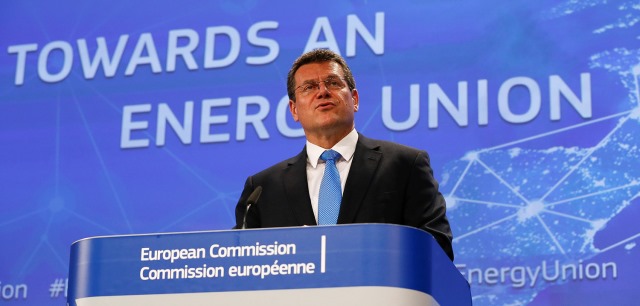EU Western Balkans boost energy ties
 At the Western Balkans Summit in Vienna, European Commission Vice-President for Energy Union Maroš Šefčovič was expected to look for ways to boost energy infrastructure and connectivity as well as regional cooperation. Non-EU members Albania, Bosnia and Herzegovina, Kosovo, FYROM, Montenegro and Serbia are looking to integrate with the European Union’s energy system.
At the Western Balkans Summit in Vienna, European Commission Vice-President for Energy Union Maroš Šefčovič was expected to look for ways to boost energy infrastructure and connectivity as well as regional cooperation. Non-EU members Albania, Bosnia and Herzegovina, Kosovo, FYROM, Montenegro and Serbia are looking to integrate with the European Union’s energy system.
A European Commission spokeswoman told New Europe on August 27 that the member states agree and endorse five projects, which have been pre-selected by the energy ministers of the Western Balkan countries already, and this list of priority projects will now be consorted on highest level.
These projects are: Albania – FYROM electricity interconnection, Serbia – Montenegro – Bosnia and Herzegovina electricity interconnection, Serbia – Romania electricity interconnection, Trans-Balkan electricity corridor in Serbia and the Serbia-Bulgaria gas interconnection which is linked to the Interconnection Pipeline from Nis in Serbia to Dimitrovgrad in Bulgaria.
“It’s a selection of key projects which are important for the Western Balkan region to interconnect the Western Balkans with the internal markets and to adapt the necessary infrastructure. These are the projects on the table now,” the spokeswoman said, adding that Šefčovič was expected to discuss the energy infrastructure projects on the level of the energy/economic ministers meeting on August 27.
“The energy union does not stop at the Union’s borders. That’s why we spare no effort to better connect the Western Balkans to our own energy systems,” Šefčovič has said.
Independent consultant Peter Poptchev, a long-time Bulgarian ambassador-at-large for energy security, told New Europe on August 27 that the Bulgaria-Serbia Interconnector is vitally important to a fully functioning energy market in Southeast Europe and to the Energy Union in the region.
“This would be the interconnection that would maximise the ‘market opening’ effect of IGB [Interconnector Greece Bulgaria], new LNG terminals in Greece and Croatia and any new long-haul trans-border pipelines like TAP [Trans Adriatic Pipeline], South Stream, Turkish Stream or Eastring. The BSI and other such interconnectivity infrastructure, including, preferably, jointly-owned storage facilities, would help the countries n SEE to move from the present declaratory to a cooperation and gradual integration of substance,” Poptchev said. He added that he favours expanding the capacity of the projected pipeline, which is planned to carry about 1.8 billion cubic metres of gas annually in both directions.
While in Vienna, Šefčovič was also expected to meet Ukrainian Energy Minister Volodymyr Demchyshyn to discuss the resumption of gas talks between Kiev and Moscow, mediated by Brussels. Ukraine wants to top up its gas storage before the start of winter, while Gazprom is under growing pressure due to falling gas and oil prices as well as an anti-trust probe launched by the European Commission against the Russian gas giant.
Šefčovič will meet the Ukrainian Energy Minister later on August 27. “The bilateral gas talks will start very late afternoon and depending on the outcome and the discussions we will issue late night statement on the Ukrainian situation,” the Commission spokeswoman said.
“We don’t have a date for the trilateral yet. The idea is that we talk with the Ukrainian side today. We have a second bilateral with the Russian side on September 11 and only then we will be able to see if there is enough political will to come together in a trilateral meeting. We don’t have a date yet,” she said.
